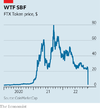Well yes, but what competent financial or business manager would recommend such a huge stake in FTX? No doubt they will be live quite comfortably regardless of the FTX investment debacle.Can't imagine TB or Giselle having the time to work out their own finances. All these American athletes have business managers who manage their finances. Very rarely do they do it themselves. They also both still earn $40+ million a year.
Financial literacy aside, it was always the extreme hubris that's been most annoying. The mere suggestion to the crypto crowd that perhaps crypto is just a fad, promoted by pump and dump merchants with its price pure speculation supported by hopium and the bigger fool principle would usually garner dismissive remarks like "just stay poor". The music stopped a year ago for Bitcoin, -75% later and now it's clear who is going to the poor house, crypto speculators and hodlers.I have met plenty of people who have invested in crypto but still to this day I have not met anyone I consider a financially literate who has invested money in crypto.





